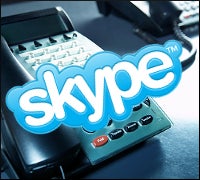 |
Voice over IP service Skype is striving to make good on efforts to increase its prominence in the enterprise, thanks to several new partnerships with IP-based PBX
The VoIP firm today said it now supports Cisco’s Unified Communications 500 Series for Small Business telephone system — courtesy of Skype for SIP, a version of Skype that uses the Session Initiation Protocol common among IP-PBX and telephony vendors.
As a result, small and midsized businesses who use Cisco’s solution can now direct their outbound calls to mobiles and landlines using Skype for SIP, while also receiving inbound calls from Skype users. Skype calls are received using the partner company’s IP-PBX system and can be handled or directed in the same way as any other inbound caller.
The idea is that by leveraging Skype, companies can save money — making and receiving domestic and international calls at Skype’s lower rates — and can take advantage of communications features available through the popular service, it said.
“In today’s tough economy, executives of smart small and medium-sized companies realize that effective communications with customers, partners and employees are a key to helping them grow their business,” Stefan Oberg, vice president and general manager of Skype for Business, said in a statement. “By certifying Skype for SIP as interoperable with the Cisco Unified Communications 500 Series, we are providing a single offering that will help many SMBs around the globe save money, save time and stay ahead of the competition.&”
In March, Skype introduced the beta version of Skype for SIP. Among the first IP-PBX businesses to begin supporting Skype for SIP were ShoreTel and SIPfoundry, both of which recently began connecting their systems with the service.
The new developments come as Skype tries to lure more corporate users as part of its long-term strategy to double revenue by 2011.
Traditionally, IT staffers have been hesitant to formally adopt Skype, seeing it as a more consumer-oriented application — an attitude that the company is hoping to mitigate with the Skype for SIP service, which promises cost savings and features including group chat, free desktop video and voice-to-text.
Skype for SIP allows businesses that have a SIP-enabled PBX to receive and manage inbound calls from the more than 480 million registered Skype users worldwide at no additional cost to the Skype user.
In addition to low-cost calling, interoperability with Skype for SIP means a company can also receive inbound voice calls from Skype users via a click-to-call button on its Web site.
While ShoreTel signals the first IP-PBX unified communications (UC) OEM to sign up for the service, SIPfoundry’s sipXecs open source enterprise IP-PBX UC solution is Skype’s second open source partner. Skype for Asterisk (SfA), which combines the open source Asterisk VoIP PBX with the Skype network, became available in early September.
“By certifying sipXecs as interoperable with Skype for SIP, we continue to demonstrate our commitment to open source and standards like SIP and SIPconnect,” Skype’s Oberg said in a statement. “Furthermore, we are giving IT administrators the opportunity to leverage a very cost-effective solution, combining the low upfront cost of an open source IP-PBX with the low-cost global calling rates that Skype is known for.”
Skype for SIP’s ability to link to IP-PBXes could mean more market share for the company, considering that about 438,000 IP-PBXes were shipped worldwide in 2008, according to research firm IDC.
“Businesses have been waiting for Skype to make a concerted push into the business space for a while,” Rebecca Swensen, IDC’s enterprise mobility and IP communications analyst, said in a statement. “Connecting to existing standards-based SIP PBXes is a good way for Skype to start doing so. It will be interesting to see how large companies change their thinking about the deployment of Skype within the network.”
Meanwhile, Skype’s entreaties into the enterprise comes during a time of uncertainty for the company, as owner eBay (NASDAQ: EBAY) formalized a deal in early September to sell a majority stake in the unit to a group of private investors for $1.9 billion.
However, the sale sparked a lawsuit by Skype’s founders, who charged eBay and Skype’s buyers with copyright violations stemming from the peer-to-peer networking code that’s at the core of the Skype service.
Skype’s founders sold Skype to eBay in 2005 for $2.6 billion. Now, however, they claim eBay is breaching its licensing contract for the code by illegally sharing it through the sale.
Controversy has also touched on the VoIP firm’s push into the mobile sector. To avoid cannibalizing the core business of the Apple iPhone’s exclusive carrier, AT&T, the Skype for iPhone app has been limited to routing calls over Wi-Fi only — as opposed to AT&T’s 3G network.
Also, the FCC’s chairman this week proposed guidelines for Net neutrality that would prevent mobile companies from discriminating against content and data carried across wireless networks. Skype issued statements backing the stance, although wireless companies have long protested efforts at such regulation.


